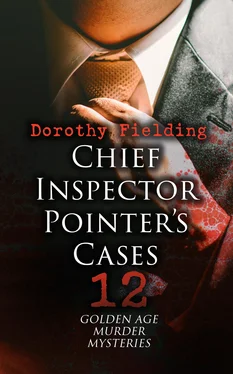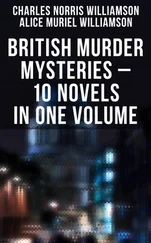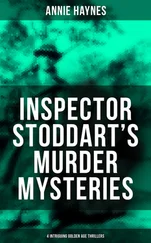"Lot's of men's prints. Vague ones we haven't got. Shop fingers, I take it. Several smallish ones in gloves. Mrs. Tangye's, in fact. But here are Vardon's clear enough. Here at the corners. Though you found the flap of the envelope gummed down, he must have opened it and read it through before he shut it up again."
"Do you still go by finger-prints?" Wilmot spoke as though to a user of bows and arrows, but Haviland refused to be drawn. He knew the most modern suspicion of that form of proof, but he himself swore by it.
"Obviously Vardon knew the contents of the will or he wouldn't have worried about it's possibly being in his bag," Pointer spoke a little dryly. "If Mrs. Tangye had left her money to the hospitals, Vardon would have told us of it, you may be sure."
Pointer's constable-clerk brought in a set of papers, and his two visitors left. They had been talking in his room at the Yard. In the plainly furnished but airy inner den where the Chief Inspector worked alone with his many knee-hole tables. One to every case, in which he was concerned. The reports brought him were from Hyam, and they helped to fill in a few more of the blanks still vacant in the puzzle.
On Wednesday morning, as soon as the banks in Manchester opened, those notes to the value of fifteen hundred pounds which Tangye said were safe, that half the Clerkhill farm price in other words, in which Pointer was most keenly interested—had among others, been handed in by a clerk from William Merchant and Son, Cotton brokers. The men who were most concerned in the great cotton boom now sky-rocketing. Tangye's hosts during at least part of his last week-end.
The notes could obviously not have been posted later than Tuesday night from town to reach Manchester by Wednesday morning. Pointer thought it even possible that Tangye had sent them off by the six-thirty collection.
Certain it was that Haviland had not found any of them in the morning-room, nor in the open safe on his arrival at Riverview ten minutes past the hour. But they might have been reposing in some other room, or even in the pockets of either Tangye or Miss Saunders.
The Chief Inspector had thought for some time that Tangye must have been at his home during the hours of suspicion, or the woman's hold over him could not have been what Pointer believed it was, a strangle-hold. He felt sure that she had seen the stockbroker there between the death of Mrs. Tangye and the arrival of the police.
Had she caught him red-handed, and helped him to erase any traces he might have left? Or had the companion only found a dead woman, drawn her own grim conclusions, and made her bargain with that knowledge, and the ready money she had found. It was a sum, which coming just when it did, might have meant salvation to Tangye, allowing him to carry on his margins until the stock soared next day.
Tangye's manner, his suppressed fury when he believed that probably double that sum had been there. His hope that the thief would be caught while he did not dare to speak clearer as to the thief's possible identity, all looked to Pointer as though Tangye had linked Miss Saunders with that loss with a promptness and a certainty that seemed difficult to understand unless Miss Saunders had been the provider of the one half, and was therefore suspected of being the thief of the other half. But if so, what had she received in exchange? She was not a woman to give up as much as a bent sixpence without some equivalent. What would she accept in return? Not money, for she was handing that over. Then, if not money, what would tempt her? Pointer knew of one thing that would. A promise of marriage. And, if he knew anything of Regina Saunders, it would have been a promise in writing. Had Tangye given her this? It would explain that air of having secretly, not as yet to be openly shown, the upper hand, the whip-hand, which had struck all three men interested in the investigation.
It would explain, too, Tangye's tone, as he had ground out between his teeth that if Mrs. Tangye had given Vardon the money, as was claimed, there would be something in writing to show for it.
Pointer pushed in the little pigeon-hole in his brain where this new item was now laid, and turned to the task immediately before him. An interview with Miss Eden, which he thought might be rather difficult. He had asked for it over the telephone, and learnt that she was down at her settlement in Bethnal Green.
He found her in a tiny private room looking very tired. "Is there anything wrong?" she asked. A poor opening move.
"Mr. Tangye now states that his wife committed suicide and withdraws all claim to the insurance money.
"We have learnt that while at the orchid-show with you, Mrs. Tangye saw her husband and—and—" Pointer looked mysterious, "jumping to conclusions—doubtless wrong ones, she first told him on Monday of her intention to kill herself, and on Tuesday carried it out."
Pointer might have been a father in an earjy Victorian drama.
Miss Eden waited.
"No No!" she murmured brokenly, "oh, no!" She covered her face with her hands. "How could she let it drive her to such a dreadful act!"
After a second she recovered herself.
"Suppose you tell me, though it's rather late in the day," Pointer was very grave, "just what did happen. We know it from other sources, but I would like to hear your side."
"How could she have let it drive her to do that?" Miss Eden murmured half to herself. Pointer felt that she had asked herself that question many times.
"Just what did she see?' he spoke less sternly now.
"It all seems so utterly inadequate," she answered wearily. "We were walking through the Brazilian Garden they made there, when suddenly Mrs. Tangye—" Mary Eden hesitated for her words, "I've heard of people starting back as though they saw an abyss opening before them, but I never saw it done before. It really was as though Mrs. Tangye felt the ground give under her. She jumped back with a sort of gasp. Her face was as white as that—" Mary touched a paper beside her, "I had been looking somewhere else, but following her eyes I saw—I just caught sight of—well, of Mr. Tangye and some woman's sleeve—turning the next corner ahead of us."
There was a short silence.
"That was all. Absolutely all. Of course—I know—Mrs. Tangye had some previous knowledge, and recognised the sleeve. But why should she have looked like that? She let me lead her away as though she were in a sort of dream, but as soon as we sat down she jumped up, and said she wanted to go back for a moment, would I mind waiting for her? She was only gone ten minutes at most, if as long. When she joined me again, she wanted to leave at once. Would I stay on without her? She thought fresh air might do her good. I insisted on going to the station with her. Walking up and down the platform, waiting for the train to come in, she told me about a letter, which had brought her down to the show. I had not heard of it before, or I should not have gone with her."
"Can you recall the exact words in which she spoke of the letter?" Pointer asked.
Miss Eden thought for a moment.
"As nearly as I can recollect her words, they were, 'To think that I only came down because of that woman's silly letter.' Then she was silent until the train came in."
"Was Mrs. Tangye angry?"
"I think she was too stunned to be angry. She seemed really quite dazed. I think—" Miss Eden showed her perplexity in her face, "I think Mrs. Tangye must have been brooding over her troubles until she lost her mental balance. What was there in all this to give such a terrible shock as she had had? I think there must be more behind, than we shall ever know. Some family tendency to suicide. Some morbid strain."
"And the letter she wrote you?"
"I kept it." She flushed scarlet. "But I couldn't bear-, when there was no need—for you to see that last note of hers. But now that there's a question of some innocent person being implicated in quite a wrong idea of Mrs. Tangye's death, you ought to read it. Here it is." She held it out to him.
Читать дальше












